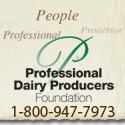 |
 |

|
|
|
New York Ag News Headlines |
 |
Look for the Zero: Buy Phosphorus-Free Lawn Fertilizer
New York Ag Connection - 04/06/2020
New York State Department of Environmental Conservation (DEC) Commissioner Basil Seggos announced launch of the state's annual "Look for the Zero" public awareness campaign that encourages homeowners to go phosphorus-free when using lawn fertilizer. DEC is encouraging consumers to review bag labels for phosphorus content when shopping for fertilizer. Fertilizer labels have three numbers. The number in the middle is the percentage of phosphorus in the product, such as: 22-0-15. More than 100 water bodies in New York State cannot be used or enjoyed due to phosphorus overuse.
"With spring upon us and property owners turning to work on their lawns as a break from COVID-19, DEC encourages New Yorkers to 'Look for the Zero' and buy phosphorus-free fertilizer this spring. Excess phosphorus is a threat to many New York waterbodies, rendering these waters un-swimmable and un-fishable. By implementing sustainable lawn care, New Yorkers are helping to eliminate phosphorus and reduce pesticide use on lawns, protecting water quality and public health," said Commissioner Seggos.
DEC first introduced "Look for the Zero" in 2017, with a public service announcement that shows the after effects of fertilizer runoff on New York's waterbodies.
New York's nutrient runoff law prohibits the use of phosphorus lawn fertilizers unless a new lawn is being established or a soil test shows that the lawn does not have enough phosphorus. Generally, only newly established lawns or those with poor soil need phosphorus. Phosphorus applied to existing lawns should not be used and can cause water pollution. Regardless of the location, excess phosphorus from lawns can wash off and pollute lakes and streams, harming fish, pets, or people that use these waters for recreating and a source of revenue for towns that must close beaches or boating areas.
New York State law requires retailers to post signs notifying customers of the terms of the law and to display phosphorus fertilizer separately from phosphorus-free fertilizer. Homeowners are encouraged to practice more sustainable lawn care and to choose native plants and grasses, which are adapted to the local climate and soil conditions. These plant species provide nectar, pollen, and seeds that serve as food for native butterflies, insects, birds, and other animals. Organic lawn care can easily be implemented on any lawn. Safe and effective alternatives exist for most chemical pesticides and fertilizers. Organic lawn care treatments promote deep root systems, natural photosynthesis, and longer grass growth. Visit DEC's Sustainable Landscaping web page to learn more.
Additional recommendations for sustainable lawn care include spreading a quarter inch of compost on the lawn to improve moisture retention and soil texture and add beneficial microorganisms and nutrients. Another suggestion is to allow grass to grow to three inches and then cut no more than one inch off the top. This is the "one-third" rule and helps to develop a deeper root system, which is a natural defense against weeds, disease, and drought. Visit DEC's Lawn Care web page for more information.
DEC also encourages homeowners to leave lawn clippings after mowing to improve the health of the lawn. Grass clippings are 80 percent water and contain two to four percent nitrogen, phosphorus, potassium, and other nutrients. Leaving clippings also saves homeowners time after mowing and reduces the amount of garbage thrown out. Grass clippings can account for as much as 10 percent of garbage.
DEC has posted a video to its YouTube channel that shows how phosphorus can run off lawns and enter our waterways. For more information, visit DEC's Lawn Fertilizer web page.
New York's nutrient runoff law does not affect agricultural fertilizer or fertilizer for gardens.
|
 |


|
 |
|
Copyright © 2024 - Farms.com. All Rights Reserved. |
 |
|